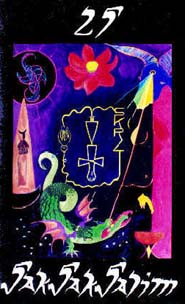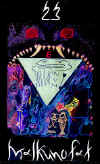
After my last post Reiki Sorcery wants to know how I work with Liber 231. Fairly loosely is the best way to describe it.


THE SUBTLE KEYS OF SORCERY
Delmarva Pagan Pride Festival, Dover DE
http://www.bellbookandcandle.biz/index.php?pr=Pagan_Pride_Day
Sunday, August 23rd
Every ritual ever written is really a collection of words, gestures,
breaths, gazes, and mental exercises that are strung together to form
a whole. Like Katas or Forms taught to Martial Artists, these rituals
serve a purpose in and of themselves, but the advanced practitioner
must learn how to break them down into their component parts and use
each individually.
Teaching from his new book The Sorcerer's secrets, Jason will share
some of these seemingly small tricks of gaze, voice, and mind that are
closely guarded secrets in some occult circles. These subtle keys that
can either be incorporated into larger rituals or used alone.
 The other night I picked up a copy of the first American Edition of Witchcraft in Yorkshire by Patricia Crowther. This book was written 1973 but only published in England. This new edition is a limited edition of 750 copies put out by Harvest Shadows and features a forward by my good friend Albert Busseti, who is also handling the distribution of the work. The book is a 70 page paperback with a very attractive metalic copper, black and white cover. It is a real labor of love for the people that put it out.
The other night I picked up a copy of the first American Edition of Witchcraft in Yorkshire by Patricia Crowther. This book was written 1973 but only published in England. This new edition is a limited edition of 750 copies put out by Harvest Shadows and features a forward by my good friend Albert Busseti, who is also handling the distribution of the work. The book is a 70 page paperback with a very attractive metalic copper, black and white cover. It is a real labor of love for the people that put it out. 

Tomorrow night at Mystical Tymes!
Modern Sex Magick
Once considered a closely guarded secret of the upper echelons of magickal orders, Sex Magick is a controversial and powerful facet of the magickal art. Due to improved scholarship, influx of teachers from authentic eastern traditions, and societies increased openness about sex itself, there is more and better information currently available in the public arena than that which formed the secret teachings of the old orders. In this class Jason will talk frankly about the history and techniques of Sex Magick, giving practical exercises for men and women

 Hi all.
Hi all. 
Scott over at Augeides posted a rebuttle to some of what I had to say about the frequency of psychic attack in a recent interview I have to the SoulJournings blog. I want to thank him for bringing attention to the interview, and thus advertising for me; and for making well reasoned arguments in his critique rather than some of the silly criticisms that are sometimes made. I think he is wrong of course, but this is largely based on us having a very different experience. I am not going to draw that conversation over here exactly, those interested in the argument can check out his posts, and others in the past where we have debated the same thing.
In the process of making his case though, he touched upon a subject with larger implications. He states:
“Casting a spell with a targeted, measurable macrocosmic effect is not easy. If it were the effectiveness of magick would be an undisputed scientific fact. Part of the reason that spells are so difficult to test empirically is that so few people can perform them in such a way that they produce noticeable, tangible results. An effective curse consists of a lot more than hitting up the local occult store for some Anna Riva war water and splashing it on somebody's doorstep. The power comes from the magician, the materials just help to focus the effect.”
This is a topic worth exploring on its own: who can do effective magick? What does it take?
Here again, I respect Scotts thought process, but experience has taught me differently. I have two specific arguments to make, the first is about the power of the magician necessary and the second is about the role of material in magick.
My first few spell attempts were spectacularly successful; one of them frighteningly so. This beginners luck is something that other people have also observed, their first attempts at magick ended up being very successful. The strange part is that as they began to learn the art, their effectiveness actually decreased for a time. It is as if learning the rules of magick is counter-productive to the performance of magick until such a time as you have really integrated them.
This success has been accounted for in a number of ways. Simon once told me that it was because doing something mysterious and forbidden had its own energy – the energy of blind faith. You are told that a certain ritual will work and even if you don’t know why it will, you believe it will which is a heck of a lot of energy. Learning the actual rules of how it works takes some of the mystery and faith away, and thus requires the adept to channel it a different way.
Another explanation is pure focus. When a jilted woman buys a candle spell to get back at a lover, she lights the candle and just lets it rip. She doesn’t think about letting it rip. Trained magicians, especially Chaos and Ceremonial magicians go through a whole “statement of intent” process that takes the whole thing from the emotional to the intellectual. The spell has its balls cut off by you trying to stand their in perfect stance, and thinking about your intent rather than just intending. Chances are if you are there with a green pyramid candle, a bottle of steady work oil, and some desperate prayers that you don’t get laid off and go bankrupt, you are really friggin focused; you don’t need to tell yourself to focus, than breathe, than have some contrived moments to eye squinting fake telepathy.
Magick is so easily accomplished that most cultures acknowledge the idea that it can be done accidentally. In
The second issue that I have is about the use of materia magica. Scott say’s that the power comes from the magician, and the materials just help focus. Meh. While it is true that magical materials are mostly “dead” until brought to life in a spell by a worker, that doesn’t mean that they are merely focusers. This is a common attitude amongst many ceremonialists who do not fully understand magick that is worked with materials. Its also somewhat disrespectful. For years and years magicians and shamen have been painstakingly recording their formulas. How foolish of them! They could have just picked up any old rock and used it as a focus! Really? Is this what we think of any type of magick that doesn’t work the way we think magick works? I call Bullshit.
In short, there does NOT have to be anything more to a curse than a pissed off person going to the local botanica, buying a batch of war water and splashing it on someone’s doorstep. In fact I have seen people do just that and cause problems for a Thelemic ceremonialist that he had a very difficult time dealing with.